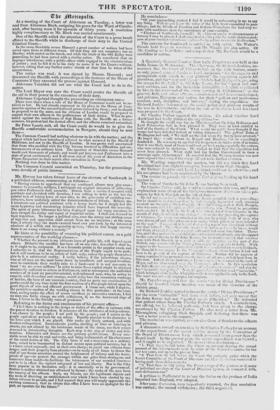iglu _Metropolis.
At a meeting of the Court of Aldermen on Tuesday, a letter was read from Alderman Birch, resigning his gown for the Ward of Candle- wick, after having worn it for upwards of thirty years. A resolution highly complimentary to Mr. Birch was carried unanimously.
One of the Sheriffs called the attention of the Court to a gross insult offered to the Sheriffs while in discharge of their duty in the Central Criminal Court-
in the cause Stockdale versus Hansard a great number of notices had been served upon them at different times. Of that they did not complain; but on Monday, while seated on the bench, and while the trials at the Old Bailey were proceeding., he had been served with a similar notice. He considered that an improper interference with a public officer while engaged in the administration of justice ; and he felt it to be his duty to name it to the Court—without, however, asking that any further notice should at that time be taken of the circumstance.
The notice was read : it was signed by Messrs. Hansard; and threatened the Sheriffs with proceedings at the instance of the House of Commons if they executed the process against Hansard. Alderman Venables did not see what the Court had to do in the Matter.
The Lord Mayor was sure the Court would render the Sheriffs all the aid in their power in the execution of their duty. Alderman Copeland thought the proceeding an outrageous one— There were times when a vote of the House of Commons would not be re- ceived as law. He had already expressed in his place in the House of Com- monshis opinion of the unconstitutional power claimed by them ; and he should be prepared to do the same, and the citizens of London would be prepared to support their own officers in the Rerformance of their duties. When he pro- tested against the interference of that House with the Sheriffs on a former occasion, his protest had the desired effect, and the officers remained untouched.
Sir Peter Laurie said, all the Court could do would be to give the Sheriffs comfortable accommodation in Newgate, should they be sent there—
The Common Council had nothing whatever to do with the matter; and the subject which had been introduced referred to what occurred to the Sheriff of Middlesex, and not to the Sheriffs of London. It was pretty well ascertained
that those who meddled with the City became involved in difficulties and em- barrassments of no ordinary kind. The question of Stockdale versus Hansard would cost thousands of' pounds, and would put lawyers and Parliament into a state of great excitement; and it all arose out of the want of discretion in the Prison-Inspectors in their search after curiosities in Newgate.
Nothing was done in this matter.
The Common Council assembled on Thursday, but the proceedings were devoid of public interest.


























 Previous page
Previous page